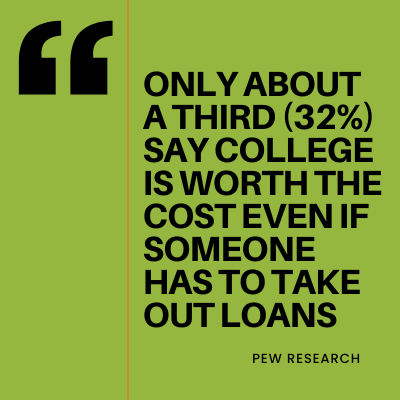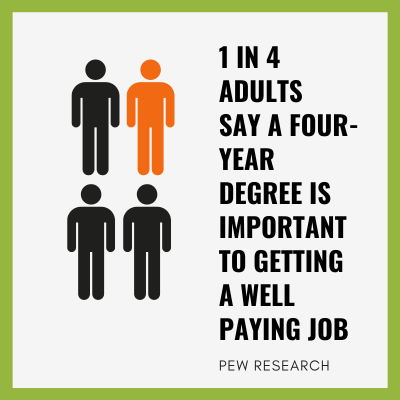When your degree matters
- A Bachelor’s degree is often times considered an expected prerequisite for entry-level jobs.
- Degrees can contribute to a higher salary.
- Time spent obtaining a degree can include valuable knowledge, lessons, networking, and stepping stones that have the ability to better guide an individual to their industry.
- Education can create confidence. Time and effort spent in school can be an investment for the future that adds an edge of accomplishment to the character of a job seeker.
- When an individual is up against another candidate of similar capabilities the candidate with a minimum degree requirement, advanced degree, or best fitting degree is more likely to be chosen.
When your degree does not matter
- Real-life work experience has the possibility to impress in a way classroom experience does not. Many employers seek work experience in their candidates (Tip: combining both education and work-based learning can create the ultimate package of certificate and skill).
- Degrees can contribute to a higher salary.
- Not all industries require degrees that match. A category of degree does not always have to be relevant to the area of work you desire.
- Individuals reach maximum performance in areas of passion and purpose, not necessarily in the areas they went to school for.
- College majors may take a silver medal while network and managing it will take the gold.
Taking these points into account may be a valuable part of an individual’s response to their degree or lack there of. If you have found yourself in the midst of choosing your degree of study, seeking to gain an additional degree, or even embarking on work-force pursuits without a degree, these points can be an effective part of getting ready for your next move. To better understand a degree’s purpose, Cornerstone University has provided statistics that feature the outcomes of Americans with degrees vs Americans without degrees. With the help of the 2014 Pew Research studies, Cornerstone University has highlighted these observations:
- 72% of millennials ages 25-32 say their degree has already payed off.
- College graduates age 25-32 earn $17,000 more each year.
- Millennials without a degree are three times as likely to say their job is just to help them get by.
- Almost four times more millennials without a college degree live in poverty at 22% to 6%.
- The monetary value of a high school diploma is falling.
- The unemployment rate for millennials without a college degree is three times as high than those with a degree (12.2% vs 3.8%).


